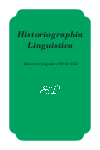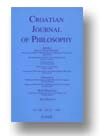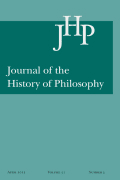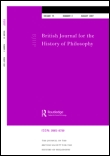
Journal of the Philosophy of History
Scope & Guideline
Advancing Philosophical Insights into Historical Narratives
Introduction
Aims and Scopes
- Philosophical Foundations of History:
The journal investigates the conceptual foundations that inform historical inquiry, offering insights into the nature of historical knowledge, the role of narrative, and the implications of different historical methodologies. - Interdisciplinary Approaches:
It promotes interdisciplinary dialogue, integrating perspectives from philosophy, history, cognitive science, and cultural studies to enhance the understanding of historical phenomena. - Critical Engagement with Historical Theories:
The journal emphasizes critical engagement with established historical theories, encouraging debates on realism, anti-realism, and the role of narrative in historiography. - Contemporary Historical Issues:
It addresses contemporary issues within historical discourse, including the politics of memory, representation, and the impact of modern technologies on historical understanding. - Methodological Innovations:
The journal explores innovative methodologies in the study of history, advocating for new theoretical frameworks that challenge traditional historiographical boundaries.
Trending and Emerging
- Anti-realism in Historical Discourse:
Recent publications emphasize the exploration of anti-realism in history, questioning the nature of reality and the validity of historical facts, which resonates with ongoing debates in philosophical circles. - Narrative and Memory Studies:
There is an increasing focus on the interplay between narrative and memory, particularly in understanding collective memory and its implications for historical representation and identity formation. - Philosophical Reflections on Modern Historiography:
The journal has begun to explore modern historiography critically, examining how contemporary theories and practices shape our understanding of the past and influence historical scholarship. - Intersection of History and Technology:
Emerging discussions on how digital technologies and virtual realities impact historical representation and scholarship point to a significant trend towards integrating technological perspectives within historical philosophy. - Cultural Critique and Historical Understanding:
There is a growing trend towards analyzing the cultural dimensions of historical understanding, focusing on how cultural narratives shape and are shaped by historical processes.
Declining or Waning
- Traditional Narrativism:
There seems to be a waning interest in traditional narrativist approaches to history, as contemporary scholarship increasingly favors more critical and reflexive methodologies that question the reliability and authority of historical narratives. - Historical Objectivism:
Discussions surrounding strict objectivism in historical analysis are becoming less frequent, possibly due to the growing recognition of the subjective elements inherent in historical interpretation and the narrative construction of history. - Eurocentrism in Historical Analysis:
As global perspectives in history gain traction, discussions rooted in Eurocentric frameworks appear to be diminishing, reflecting a broader shift towards inclusive and diverse historical narratives. - Overemphasis on Empirical Evidence:
There is a noticeable decline in the focus on purely empirical approaches to history, as scholars increasingly advocate for theoretical and philosophical considerations that account for the complexities of historical interpretation.
Similar Journals

HISTORIOGRAPHIA LINGUISTICA
Illuminating the Intersections of Linguistics and HistoriographyHISTORIOGRAPHIA LINGUISTICA, published by John Benjamins Publishing Co, is a distinguished journal dedicated to the interdisciplinary study of language and history. With its ISSN 0302-5160 and E-ISSN 1569-9781, this journal has been an influential platform since 1974, and it is set to continue its valuable contributions to the field up until 2024. Based in the Netherlands, the journal explores the connections between linguistic and historiographical methodologies, fostering a dialogue among scholars in the realms of History and Language Studies. Notably, it holds a respectable impact factor, ranking in the third quartile for History and fourth for Linguistics and Language, as per the 2023 category quartiles. In the Scopus database, it ranks 589th out of 1760 in Arts and Humanities - History (66th percentile) and 508th out of 1088 in Arts and Humanities - Language and Linguistics (53rd percentile). HISTORIOGRAPHIA LINGUISTICA serves as a vital resource for researchers, professionals, and students, aiming to deepen their understanding of how linguistic perspectives can inform historical scholarship.

Epistemology & Philosophy of Science-Epistemologiya i Filosofiya Nauki
Pioneering Insights in Epistemology and ScienceEpistemology & Philosophy of Science-Epistemologiya i Filosofiya Nauki is a prestigious journal published by the Russian Academy of Sciences - Institute of Philosophy, dedicated to advancing the discourse in the fields of epistemology, philosophy of science, and related disciplines. With a distinguished presence in academia, this journal is recognized for its exceptional contributions, evident through its categorization as a Q2 journal in Arts and Humanities and Philosophy, and a Q1 journal in Cultural Studies. Covering an expansive scope from 2017 to 2023, it facilitates a vital dialogue among scholars and professionals aiming to explore the intersections of knowledge, culture, and education. Although currently not open access, the rigorous peer-review process ensures that only high-quality research is published, enriching the intellectual landscape. The journal's commendable rankings in Scopus, particularly in Arts and Humanities and History and Philosophy of Science, reflect its commitment to scholarly excellence. For researchers, educators, and students, Epistemology & Philosophy of Science serves as an essential resource for understanding and contributing to the ongoing philosophical dialogues that shape our comprehension of scientific inquiry.

CLIO-A JOURNAL OF LITERATURE HISTORY AND THE PHILOSOPHY OF HISTORY
Unraveling the Tapestry of History and LiteratureCLIO: A Journal of Literature, History, and the Philosophy of History, published by Indiana University-Purdue University, serves as a pivotal platform for scholars and students alike. Since its inception, this journal has offered a unique convergence of literary analysis, historical context, and philosophical inquiry, creating a rich dialogue across disciplines. With an ISSN of 0884-2043, CLIO has evolved alongside the academic landscape from its early days in the late 20th century, reflecting the changing paradigms of literature, history, and philosophical thought. Although currently categorized in the Q4 quartile across its three relevant fields—History, Literature and Literary Theory, and Philosophy—it continues to invite contributions that challenge traditional boundaries and foster interdisciplinary research. While not currently an Open Access journal, CLIO remains an essential resource for those invested in the critical exploration of historical narratives and literary expressions, appealing to all who seek to understand the intricate weave between past and present.

Croatian Journal of Philosophy
Connecting Ideas, Shaping Philosophical InquiryCroatian Journal of Philosophy is a distinguished academic platform dedicated to the advancement of philosophical discourse, published by KRUZAK D O O. With an ISSN of 1333-1108 and an E-ISSN of 1847-6139, this journal has been a key player in the field since its inception in 2008, continuing to progress through its converged years until 2024. Recognized for its scholarly contributions, it holds a prestigious placement in Q3 within the philosophy category for 2023 and ranks #571 out of 806 in Scopus, reflecting its engagement with a broad spectrum of scholarly discussions and ideas. Though it operates without an Open Access model, the journal remains a vital resource for researchers, professionals, and students who are keen to explore contemporary and traditional philosophical issues from diverse perspectives. The journal's commitment to expanding the boundaries of philosophical inquiry emphasizes the significance of interdisciplinary dialogue, making it a reputable choice for those seeking to deepen their understanding of philosophical thought.

Ingenium-Revista Electronica de Pensamiento Moderno y Metodologia en Historia de la Ideas
Exploring the Evolution of Modern Thought.Ingenium - Revista Electronica de Pensamiento Moderno y Metodologia en Historia de la Ideas is a pivotal academic journal dedicated to the exploration and analysis of modern thought and methodological frameworks in the history of ideas. Published by the esteemed Universidad Complutense de Madrid, this journal serves as a vital platform for scholars interested in interdisciplinary studies that merge philosophy, history, and social sciences. With an ISSN of 1989-3663, Ingenium stands at the forefront of academic discourse, encouraging the dissemination of knowledge without barriers through its Open Access principles. By fostering a rigorous academic environment, Ingenium aims to enrich the scholarly community's understanding of the evolution of ideas and their impact on contemporary thought. As such, it is an essential resource for researchers, professionals, and students striving to navigate the complexities of modern intellectual landscapes.

Revue de Synthese
Connecting Tradition with Modern ThoughtRevue de Synthèse, published by BRILL, is a distinguished journal in the field of Philosophy, recognized for its rich academic tradition since its inception in 1950. With an impressive history of converged years and a steady commitment to philosophical discourse, the journal offers a platform for scholars to present innovative ideas and critical analyses. Although currently listed in Q4 of the 2023 category quartiles, it serves as an essential resource for those pursuing interdisciplinary studies, enriching the philosophical landscape amidst global intellectual challenges. The journal is not currently available as Open Access, making its curated content accessible through institutional subscriptions. With an ISSN of 0035-1776 and E-ISSN of 1955-2343, Revue de Synthèse aims to empower researchers, professionals, and students alike with transformative insights that advance the understanding of contemporary philosophical issues.

Anales del Seminario de Historia de la Filosofia
Exploring the Depths of Philosophical HeritageAnales del Seminario de Historia de la Filosofia, published by UNIV COMPLUTENSE MADRID, SERVICIO PUBLICACIONES, is a distinguished open-access journal that has been contributing to the fields of History and Philosophy since 1980. With an ISSN of 0211-2337 and E-ISSN 1988-2564, it aims to provide a scholarly platform for the dissemination of original research and critical reviews pertinent to the historiography of philosophy and its influences on modern thought. The journal features a robust open-access model, ensuring that all published content is readily available to researchers, students, and professionals worldwide. The journal currently enjoys recognition within its field, classified within the Q3 quartile in History and Philosophy of Science and Q2 quartile in Philosophy as of 2023. Positioned within the heart of Spain, the journal facilitates international academic dialogue and invites submissions that explore the intersection of past philosophical contexts and contemporary issues. Whether you are a seasoned scholar or a budding philosopher, Anales del Seminario de Historia de la Filosofia aims to foster a deeper understanding of philosophical traditions and their ongoing relevance in today’s discourse.

JOURNAL OF THE HISTORY OF PHILOSOPHY
Illuminating the Path from Antiquity to ModernityJOURNAL OF THE HISTORY OF PHILOSOPHY is a premier academic journal dedicated to advancing the study of philosophical thought from antiquity to modernity. Published by Johns Hopkins University Press, this esteemed journal features a range of scholarly articles that delve into the historical context, development, and impact of philosophy across civilizations. With an ISSN of 0022-5053 and an E-ISSN of 1538-4586, it boasts an impressive rank of Q1 in Philosophy as of 2023, recognizing its influence and contribution to the field. The journal, which has been publishing since 1975, offers insights that are invaluable for researchers, professionals, and students dedicated to the exploration of philosophical traditions and their legacies. Although it operates under a subscription model, the rigor and depth of the research published make it an essential resource for anyone interested in philosophical inquiry. With its commitment to scholarly excellence and critical discourse, the JOURNAL OF THE HISTORY OF PHILOSOPHY serves as a vital platform for new ideas and connections in the realm of philosophy.

History of Philosophy & Logical Analysis
Critical Insights into Philosophy and Logical StructuresHistory of Philosophy & Logical Analysis, published by BRILL, is an esteemed journal dedicated to the exploration and critical examination of philosophical thought and its logical structures. With an ISSN of 2666-4283 and an E-ISSN of 2666-4275, this journal serves as a vital platform for scholars in the fields of philosophy and the history of science. Based in the Netherlands, at Plantijnstraat 2, P O Box 9000, 2300 PA Leiden, Netherlands, the journal operates without open access, ensuring a curated selection of high-quality research outputs. Recognized for its scholarly impact, it holds a Q3 ranking in *History and Philosophy of Science* and a Q2 ranking in *Philosophy* as of 2023. Covering a broad spectrum of topics related to logical analysis and philosophical inquiry, the journal aims to connect contemporary philosophical debates with historical perspectives. It supports researchers, professionals, and students alike in their quest for knowledge and understanding within these critical domains.

British Journal for the History of Philosophy
Connecting Historical Philosophies to Contemporary DiscourseThe British Journal for the History of Philosophy, published by ROUTLEDGE JOURNALS, TAYLOR & FRANCIS LTD, is a leading academic journal dedicated to the exploration and critical examination of historical philosophies and their implications. Founded in 1993 and operating through 2024, this quarterly publication holds a prestigious status, being ranked Q1 in Philosophy with a Scopus rank of 188 out of 806, placing it in the 76th percentile within the arts and humanities domain. The journal is unique in its commitment to showcasing interdisciplinary research, catering to scholars, professionals, and students interested in philosophical history's complexities and developments. Although it does not currently offer Open Access options, it remains an essential resource for contemporary debates and historical insights in philosophy, contributing to the wider academic discourse on ethical, epistemological, and metaphysical inquiries.